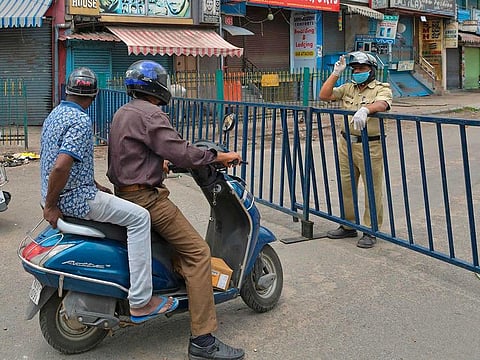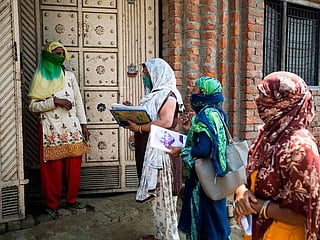Keeping track of virus infected is scary
I have nothing to hide, and anyway Google and Facebook already know everything about me

Also In This Package
I finally downloaded the privacy-encroaching app that tracks people, after Ravi, our driver, said his home is now in a coronavirus red zone. The driver has been very careful, he wears a mask at all times, and sanitises his hands immediately after he brings the grocery shopping to the car. He rants even more than my wife, in a polite South Indian sort of a way.
He just cannot understand why so many foolish people do not wear masks. “If they do not care for their lives, at least they should think about others,” he whinges. He has two young children and is obviously worried about their future.
Being in a virus red zone, ‘containment zone’, means the street where he lives and part of the neighbourhood has been sealed off by the police and nobody can get out for a couple of weeks. Food and essentials are supplied to these people in the zones, and we will not be seeing Ravi for some time.
The coronavirus positive cases in Bengaluru, India’s IT and start-up hub, have alarmingly spiked despite the city being under lockdown for many weeks, but the chief minister has ruled out a further lockdown, saying that the state economy was equally important, and shutting down now would hurt everyone even more.
Contact tracing app
The New Delhi Government app that I downloaded is called ‘Aarogya Setu’(no, it has nothing to do with the rogue element in Starwars), and loosely translated it means, The Bridge for Liberation from Disease.
Aarogya Setu is basically a coronavirus contact tracing, mapping and also a self-assessment app. Despite initial concerns that it would breach your privacy, the app was an instant success as more than one million Indians installed it on their smartphones in just over a month. Indians, however, take their privacy very lightly. “I have nothing to hide, and anyway Google and Facebook already know everything about me and what I am planning to do,” said a tech-savvy friend.
My wife was apprehensive. “Don’t download it,” she warned. Incidentally, she is the one that installed CCTV cameras in her mother’s home in Delhi and watched her every move from Dubai. “She must know what ‘Big Brother’ means exactly,” I thought to myself. A French ethical hacker going by the name of Elliot Andersen was an even bigger critic than my wife. “Hi @SetuAarogya. A security issue has been found in your app. The privacy of 90 million Indians is at stake. Can you contact me in private?” he tweeted.
At first the government denied anything was wrong, then it finally opened up the source code of the app and asked techies to find any glitches. It said all information has been encrypted and apparently made tougher for hackers to get access. Still, only 135 million Indians out of 1.36 billion are currently using the app.
Also Read: Covid-19: Salon makes me sign a consent form
Also Read: Why my wife hoards face masks
Before the app was downloaded, I was asked my age, whether I had been abroad recently, was told to self-assess myself, keep the Bluetooth open at all times, and allow GPS access. When it was finally downloaded it showed a green colour, with the words ‘You are Safe’.
Still, it was scary to know that there nine human beings who are virus ticking bombs within a kilometre radius around me and 106 guys who tested positive within the last 28 days, within a five kilometre radius.
Every morning I check the app, shout the number of people affected around us to my wife, wash my hands and pray we never become a containment zone as the 2008 horror movie Quarantine is still fresh in my mind.
— Mahmood Saberi is a storyteller and blogger based in Bengaluru, India. Twitter: @mahmood_saberi








